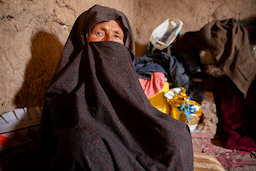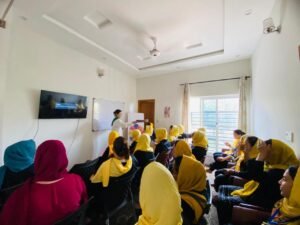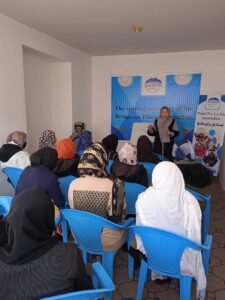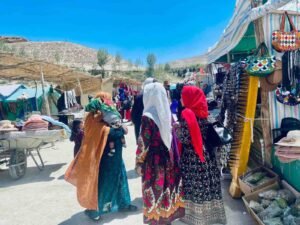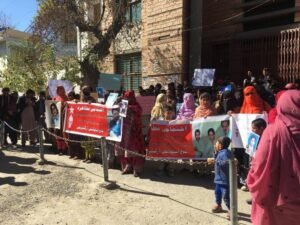A Life for Afghanistan, A Death in Exile: Remembering Saleha Farouq Etemadi

Saleha Farouq Etemadi, former Afghan Minister for Social Security in the cabinet of President Najibullah and served until the government’s collapse in 1992. Photo: X
ADN
Afghanistan has lost one of its most remarkable figures in modern history. Saleha Farouq Etemadi, a trailblazer, activist, and tireless advocate for women’s rights, passed away at the age of 94 in Geneva – far from her homeland, in exile. Her death was marked by silence, with few voices rising to honor a woman who laid the foundation for generations of Afghan women. Neither the Embassy of Afghanistan in Geneva attended her funeral nor did they send a delegation to pay tribute to her extraordinary legacy. Apart from a handful of well-wishers, there was little acknowledgment from political figures. A woman who gave her life to serve her country died quietly, far from home.
Etemadi’s life was one of courage and achievement. In May 1990, she was appointed Minister for Social Security in the cabinet of President Najibullah and served until the government’s collapse in 1992. At a time when women’s participation in Afghan politics was rare, her presence in a senior government role symbolized progress and hope for gender equality.
Her contributions extended well beyond politics. In 1963, Etemadi became the first Afghan woman to receive the prestigious French Academic Palms (Palmes Académiques) for exceptional contributions to public education and culture – a distinction dating back to the Napoleonic era. This honor underscored her status as a leading intellectual and cultural figure on the international stage.
Humanitarian Leadership
Etemadi founded the Women Volunteers Organization (Muasasa-ye Naswan), which provided material and emotional assistance to families in need, organized literacy courses for illiterate women in government offices, private institutions, and prisons, and cooperated with the Red Crescent during crises such as earthquakes and floods.
During the famine of 1971 (1350), she created a special relief committee and personally traveled to remote areas such as Ghor, Qadas, Morchaq, Faizabad, Pamir, Wakhan, Lal wa Sarjangal, Dawlatyar, and other difficult regions to distribute aid. She documented these missions in detailed reports that drew national and international attention to the plight of Afghan communities.
Global Representation
Etemadi represented Afghanistan at numerous international conferences and symposiums, including:
- UNESCO General Meeting (1960)
- International Women’s Symposium, Moscow (1967)
- Young Administrators Symposium, Delhi (1970)
- Women’s Council Conference, Bangkok
- Chair of First Committee at Tehran Symposium (1972)
- International Federation of Women Conferences in Varna (Bulgaria) and Moscow
- International Labor Conferences, Geneva (1990 & 1991)
- Asia-Pacific Labor Ministers Conference, China (1991)
- Labor Ministers of Neutral Countries Conference, Tunisia (1991)
- Afghanistan International Peace Conferences in the U.S., Amsterdam, Bonn, and Hamburg (1997–1998)
Her presence at these forums amplified Afghanistan’s voice on women’s rights, labor issues, and peace during decades of turmoil.
Despite decades of conflict, Etemadi never left Afghanistan until 1993, when she traveled to Delhi for medical treatment. During her absence, her family home in Kabul’s Shash Darak was looted and burned, and her residence in Wazir Akbar Khan was confiscated. After the death of her husband in 1995, she obtained residence in Switzerland, where she lived until her passing in November 2025.
Tributes
According to statements from the Afghanistan Freedom Front, Etemadi was among the founders of the Women’s Institute (Muasasa-ye Naswan), a driving force behind literacy campaigns, and the initiator of proposals for training and appointing Afghanistan’s first female judges and police officers during the monarchy. She also played a key role in designating June 14 (24 Jawza) as Mother’s Day in Afghanistan’s official calendar. Her last government position was Minister of Labor and Social Affairs in the early 1990s.
On November 16, 2025, Heela Najibullah, an Afghan public figure, paid tribute to her:
“#SalehaFarouqEtemadi, the former Minister for Social Security (1990–1992), a woman of substance who was not only a teacher and guide but also a representative of Afghanistan on international platforms, is no more amongst us. I looked up to her as a child and had the pleasure of meeting her when I worked in Geneva, where she resided. May her soul rest in peace; she served her people with all her might and honesty. You will be missed. I kept looking for women politicians that could match your humility, knowledge of Afghanistan, life experiences, and above all, love for our homeland and people. You will forever be my inspiration.”
Former President Hamid Karzai also expressed condolences:
“With deep sorrow, I learned that Mrs. Saleha Farouq Etemadi has passed away. She was among the first women who worked tirelessly for women’s rights and education, leaving behind invaluable and unforgettable services. I extend my condolences to her family and loved ones and pray for her eternal peace in paradise.”
Despite these heartfelt messages, her passing was met with heartbreaking silence from official institutions. No ceremonial honors, no recognition befitting a woman who shaped the course of women’s rights and social progress in Afghanistan. Her funeral in Geneva, attended by few, stood in stark contrast to the life she lived.
Yet her memory endures. Etemadi was more than a minister – she was a visionary who believed in education, equality, and justice. She opened doors for Afghan women in governance, law, and public service. Her humility, intellect, and unwavering love for her homeland remain an inspiration for generations to come.
Afghanistan mourns not only the loss of a pioneer but also the silence that surrounded her departure. May her soul rest in eternal peace. Her legacy will live on – in history books, in the hearts of those who knew her, and in the aspirations of every Afghan woman who dreams of a better future.

